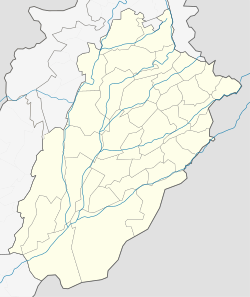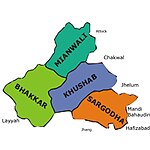Bhakkar
Bhakkar بهكّر | |
|---|---|
City | |
 Thal Canal in Bhakkar | |
 Bhakkar Location in Pakistan Show map of Punjab, Pakistan  Bhakkar Bhakkar (Pakistan) Show map of Pakistan | |
| Coordinates: 31°37′40″N 71°3′45″E / 31.62778°N 71.06250°E / 31.62778; 71.06250Coordinates: 31°37′40″N 71°3′45″E / 31.62778°N 71.06250°E / 31.62778; 71.06250 | |
| Country | Pakistan |
| Province | Punjab |
| District | Bhakkar |
| Tehsil | Bhakkar |
| Elevation | 522 ft (159 m) |
| Time zone | UTC+5 (PKT) |
| • Summer (DST) | +6 |
| Calling code | 0453 |
| Union councils | 42 |
Bhakkar (Urdu: بهكّر), is the principal city of Bhakkar District, Punjab, Pakistan. It lies on the left bank of the Indus river.
Contents
1 Administration
2 History
2.1 British rule
3 Places to Visit
3.1 Dilkusha Bagh
4 Notable people
5 References
6 Bibliography
7 External links
Administration
Bhakkar city is also the administrative centre of Bhakkar Tehsil one of the four tehsils of the district. Bhakkar Tehsil is subdivided into 17 union councils, three of which form the city of Bhakkar.[1]
History
Bhakkar was founded probably towards the close of the fifteenth century by a group of colonists from Dera Ismail Khan.[2] During the 15th century, Bhakkar saw a struggle for power between Sher Shah Suri and Humayun. It came under Humayun's rule after he restored back the Mughal empire and he appointed Khan Khanan as the governor of the city alongside Multan,[3] as Multan was a province during Mughal empire which included the city of Bhakkar in it.[4]
Fray Sebastian Manrique, a 17th-century traveller, travelled to this city in 1641 and described it as the capital of a Kingdom of Bhakkar.[5]
British rule

During British rule Bhakkar Town was part of Bhakkar tehsil of Mianwali District. It was located on the left bank of Indus River and was on the North-Western Railway line.[2]
The Imperial Gazetteer of India described the town as follows:
| “ | It stands on the edge of the Thal or sandy plain overlooking the low-lying alluvial lands along; the river, a channel of which is navigable as far as Bhakkar during the floods. To the west of the town the land is low, well cultivated, and subject to inundation, while to the east the country is high and dry, treeless, and sandy. A rich extent of land irrigated from wells lies below the town, protected by embankments from inundations of the Indus, and produces two or three crops in the year. The neighbouring riverain is full of date groves and fruit gardens; and in it stands a famous mango-tree, the fruit of which used to be sent to Kabul in the old days of Afghan rule. The municipality was created in 1874. Its income and expenditure during the ten years ending 1902–3 averaged Rs. 7,700. The income in 1903-4 was Rs. 7,500, chiefly derived from octroi; and the expenditure was Rs. 8,600. The population according to the 1901 census of India was 5,312, at that time the town contained a dispensary and a municipal vernacular middle school. [2] | ” |
Places to Visit
Dilkusha Bagh
There is an Old Date Orchard, locally known as 'Dilkusha Bagh' which is believed by some to be a Mughal garden built by Humayun, however Humayun never visited the area, on his retreat to Iran, he went to another Bakhar in Sindh to seek help from Mahmood Khan, which was however denied by historian Henry Raverty.[6]
Notable people
Rasheed Akbar Khan Nawani (political person)
References
^ Tehsils & Unions in the District of Bhakkar – Government of Pakistan Archived 9 February 2012 at the Wayback Machine.
^ abc Bhakkar Town – Imperial Gazetteer of India, v. 8, p. 44.
^ S.R. Sharma 1999.
^ Ashiq Muhammad Khān Durrani 1991.
^ Zulfiqar Ahmad 1988.
^ Bhakkar District Official Website"Archived copy". Archived from the original on 28 November 2016. Retrieved 22 October 2016.CS1 maint: Archived copy as title (link) .mw-parser-output cite.citation{font-style:inherit}.mw-parser-output q{quotes:"""""""'""'"}.mw-parser-output code.cs1-code{color:inherit;background:inherit;border:inherit;padding:inherit}.mw-parser-output .cs1-lock-free a{background:url("//upload.wikimedia.org/wikipedia/commons/thumb/6/65/Lock-green.svg/9px-Lock-green.svg.png")no-repeat;background-position:right .1em center}.mw-parser-output .cs1-lock-limited a,.mw-parser-output .cs1-lock-registration a{background:url("//upload.wikimedia.org/wikipedia/commons/thumb/d/d6/Lock-gray-alt-2.svg/9px-Lock-gray-alt-2.svg.png")no-repeat;background-position:right .1em center}.mw-parser-output .cs1-lock-subscription a{background:url("//upload.wikimedia.org/wikipedia/commons/thumb/a/aa/Lock-red-alt-2.svg/9px-Lock-red-alt-2.svg.png")no-repeat;background-position:right .1em center}.mw-parser-output .cs1-subscription,.mw-parser-output .cs1-registration{color:#555}.mw-parser-output .cs1-subscription span,.mw-parser-output .cs1-registration span{border-bottom:1px dotted;cursor:help}.mw-parser-output .cs1-hidden-error{display:none;font-size:100%}.mw-parser-output .cs1-visible-error{font-size:100%}.mw-parser-output .cs1-subscription,.mw-parser-output .cs1-registration,.mw-parser-output .cs1-format{font-size:95%}.mw-parser-output .cs1-kern-left,.mw-parser-output .cs1-kern-wl-left{padding-left:0.2em}.mw-parser-output .cs1-kern-right,.mw-parser-output .cs1-kern-wl-right{padding-right:0.2em}
Bibliography
.mw-parser-output .refbegin{font-size:90%;margin-bottom:0.5em}.mw-parser-output .refbegin-hanging-indents>ul{list-style-type:none;margin-left:0}.mw-parser-output .refbegin-hanging-indents>ul>li,.mw-parser-output .refbegin-hanging-indents>dl>dd{margin-left:0;padding-left:3.2em;text-indent:-3.2em;list-style:none}.mw-parser-output .refbegin-100{font-size:100%}
S.R. Sharma (1 January 1999), Mughal Empire in India: A Systematic Study Including Source Material, Volume 1, Atlantic Publishers & Dist, p. 124-235, ISBN 978-8-17-156817-8
Zulfiqar Ahmad (1988), Notes on Punjab and Mughal India: Selections from Journal of the Punjab Historical Society, The University of Michigan, p. 333-338
Ashiq Muhammad Khān Durrani (1991), History of Multan: from the early period to 1849 A.D., Vanguard, p. 51, ISBN 978-8-17-156817-8
External links
- Official website